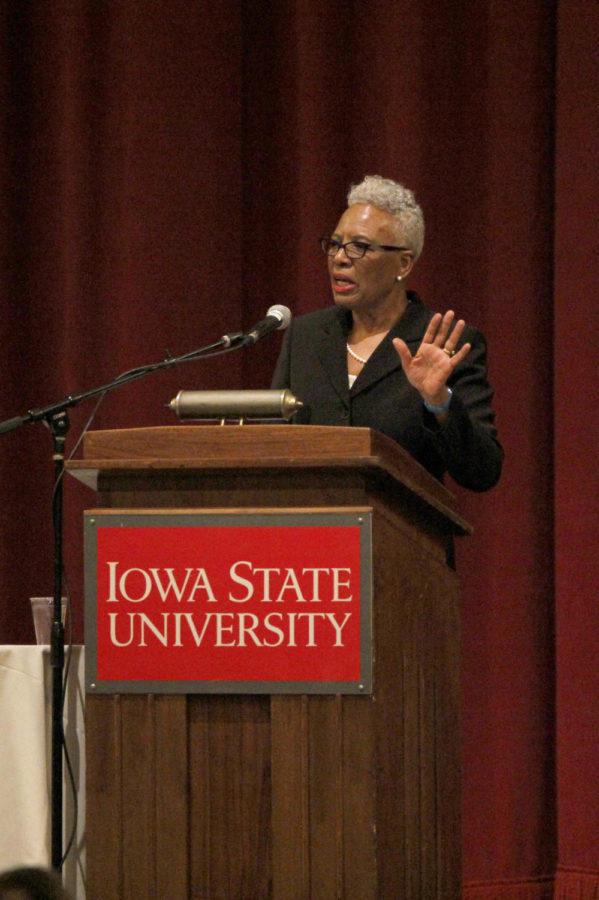Lecture talks about changes in race issues and census
Jonathan Krueger/Iowa State Daily
Nell Irvin Painter discusses the topic of “The History of White People” during her lecture Jan. 29 at the Great Hall. Painter is an Edwards Professor of American History, Emerita at Princeton University and wrote the book “The History of White People.”
January 30, 2014
Can a black scholar write about white people? That’s the question that Nell Irvin Painter, professor of American History at Princeton University tried to answer in the lecture “The History of White People.”
During that lecture, Painter addressed her book of the same name that earned her critical acclaim, including a book review in the New York Times and an appearance on the comedy show “The Colbert Report.”
“The obvious answer to the question if a black scholar can write about white people would be ‘yes,’” Painter said. “But there are some other issues that should be addressed first.”
In the past, Painter said, white people were considered normal, hardworking and wealthy, whereas the black race was associated with crime and poverty.
“That notion has changed over the year(s), however, we still use these terms without really thinking about it,” Painter said.
According to Painter, race does not simply disappear because in society it is still an issue people cannot pretend does not exist.
“There is a class dimension within race discussion,” Painter said. “When talking about the census, we still divide by race.”
Painter said that the distinction between races in the census has constantly changed and evolved over the years.
“Let’s say you wanted a new racial term called Iowa State University. The way to include that in the census would be to march down to Washington and pressure congressmen and senators to do that, which is exactly what the Hawaiians did a few years ago for example.”
As opposed to the 20th Century, there is no simple difference between black and white anymore, Painter said, not even when it comes to the definition of “white.”
“Scientists have never agreed on a number of white races,” Painter said. “They don’t know how to classify that or how to measure race in general, they only know there is more than one white race.”
In her time at Princeton, Painter said parents were more concerned about her race than about the content of the class. Even when she started writing her book, people would ask whether she would write it as a white person, she said.
“Scholars and classes should be judged by their content, because that’s what ultimately matters,” Painter said.
Ultimately black scholars can write about anybody as long as they do their scholarly homework, Painter said, and so can anybody about anybody else.
“Things can and will change,” Painter said. “Things we think we know now about race can and will also change and we should always be aware of that.”
Spencer Dewald, senior in aerospace engineering, said he found the lecture very interesting and entertaining.
“I never really thought about the census and how we think about race in general, so I learned a couple of things tonight.”
Dewald said the lecture inspired him to buy Painter’s book “The History of White People” afterwards to further educate himself about the topic.
“I would’ve liked if she had talked more about the actual history of racism and race in general,” Dewald said. “But I hope to learn more about that in the actual book.”
Elliott White, senior in biology, said that he especially enjoyed the history and the changes in the census policy over the years.
“I’ve never had to do the census because I wasn’t old enough, but that was very interesting to me,” White said.
White said that the lecture will probably make him think about the topic for the next couple of days.
“I will have to think about it and further educate myself about it to find out what I would agree or disagree with,” White said.

















